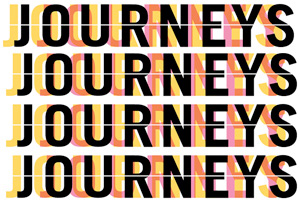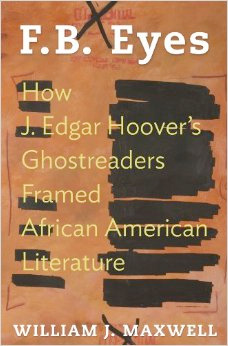| « Jamaica Kincaid Discusses Voice, Working at New Yorker | Bookmarks » |
Author Thu Oct 30 2014
Weekend of Woe/"Wow!" at the Chicago Humanities Festival
 Washington University Professor William J. Maxwell dropped a few bombs last weekend at his Chicago Humanities Festival lecture, "FBI as Literary Critic." Abandoning his Powerpoint-style slideshow for a "fuck it...what do you wanna know?" approach, Maxwell's open-endedness miffed some festival subscribers but opened the floodgates for a more expansive dialogue. He began talking of J. Edgar Hoover's interest in authors of the Harlem Renaissance and the Black Arts movement.
Washington University Professor William J. Maxwell dropped a few bombs last weekend at his Chicago Humanities Festival lecture, "FBI as Literary Critic." Abandoning his Powerpoint-style slideshow for a "fuck it...what do you wanna know?" approach, Maxwell's open-endedness miffed some festival subscribers but opened the floodgates for a more expansive dialogue. He began talking of J. Edgar Hoover's interest in authors of the Harlem Renaissance and the Black Arts movement.
The subject led to unexpected side streets of death threats and latent homosexuality. His opening anecdote involved a white FBI agent named William C. Sullivan, a professorial type and liberal arts graduate, who wrote a letter to Martin Luther King Jr. in an implied black voice. "Like all frauds," Sullivan wrote, "your end is approaching." Gasps rippled through the audience.
The letter ended, "there is but one way out for you, you better take it before your filthy, abnormal fraudulent self is bared to the nation."
A man in a starched shirt raised his hand. "This sounds something like a death threat!" he exclaimed. Maxwell had assumed that this, and Hoover's 40-year homosexual marriage, were common knowledge.
 All the surprise and hullaballoo was justified, probably. The program had been interrupted by...well, the program. Only instead of type-face and slides, we were to be treated to history by Maxwell himself, an excited, equally humble and grandiose, professor of history and literature at Washington University.
All the surprise and hullaballoo was justified, probably. The program had been interrupted by...well, the program. Only instead of type-face and slides, we were to be treated to history by Maxwell himself, an excited, equally humble and grandiose, professor of history and literature at Washington University.
"Where did you teach?" a man in a windbreaker asked balefully. "I'm sorry, I meant to say what."
Little response erupted, however, to Maxwell's most damning historical bullet point:
"Do you fear the FBI's involvement today, in a similar way?" asked an audience member in his sixties. Maxwell replied curtly:
"No."
He elaborated: Hoover's interest in Black authors was based on an assumption that literature mattered and that the written word had power. In the minds of the FBI, literature possessed the ability to elicit change. That just isn't true today, and no reigning institution has any illusion about it.
Another question was posed and the audience erupted again, at another aside (Langston Hughes -- followed to Paris?). Perhaps the terrifying implication of this statement, that literature didn't matter enough to scare anyone, didn't excite quite like the others had: Sullivan would later be assigned to head the investigation into King's death. Hoover and LBJ shared a love of food.
But...literature had no power.
Maybe I was in a unique position to be processing this epiphany; out of three events I attended this past weekend, all acknowledged the end of the human race, the inherent evil or hypocrisy of the American government and, finally, the questionable importance of the written word.
Wallace Shawn volunteered that art might be a chance for humanity to rise above its faults; however, an embittered patron of the arts quickly got on about the importance of art and culture to Nazi Germany, using words like "them" and "they" in pretty loose and, to the FBI's credit, to generally feeble effect. Regardless, though, it did put a stop on that line of talk. Her question ended what amounted to a riveting hour of philosophy, literary criticism and process (all the weekend's speakers were excellent).
Where Wallace Shawn declared the atrocities of the world, Gary Shteyngart joked about them. After the fall of the Roman Empire, he reasoned, visual art took over for nearly three hundred years, "and then -- Dante!" He has hope that, at least, his great-great-great-great-etc grandchildren will read. Shteyngart's hope-as-punchline met Shawn's hope-as-luxury met Maxwell's hope-as-fiction in one harrowing, hopeful 72 hours.
I can hardly wait for Martin Amis, who is actually scheduled to talk about the Holocaust. Likely he'll open with a bit on being a "short arse" (Amis is 5'4") and never mention Auschwitz, the subject of his most recent novel, The Zone of Interest.
The most hopeful element of the weekend, ironically, was Maxwell's apparently cordial relationship to the FBI, bolstered by the Freedom of Information Act and, ironically again - bureaucracy.
Required to turn over files on any deceased peoples (and living, too, with proper filing), the FBI has created templates and how-to's for DIY investigation and soul-searching.
I sent in immediately for Humphrey Bogart and Lou Reed; likely, according to Maxwell, I will not be rebuffed (already I've heard back to expect a few weeks processing, but the outlook is sunny).
There's the chance, of course, that there are not files on either of these white men. Maxwell's father, a friend to radicals in the 70's, had always feared FBI surveillance. To his great disappointment, Maxwell discovered that his father didn't even have a file.
The relationship he describes, however, between Hoover and the Harlem Renaissance seemed specific to ethnic unknowns and political content. Power in the unknowable. Bogart and Reed, though equal parts hardass, had little beef with the government that wasn't easily overcome. Both men died wealthy, one with his own self-designed headphones.
The same cannot be said of Chester Himes.
William J. Maxwell's book, F.B. Eyes: How J. Edgar Hoover's Ghostreaders Framed African American Literature is available everywhere, but notably here and here, via Princeton University Press.









